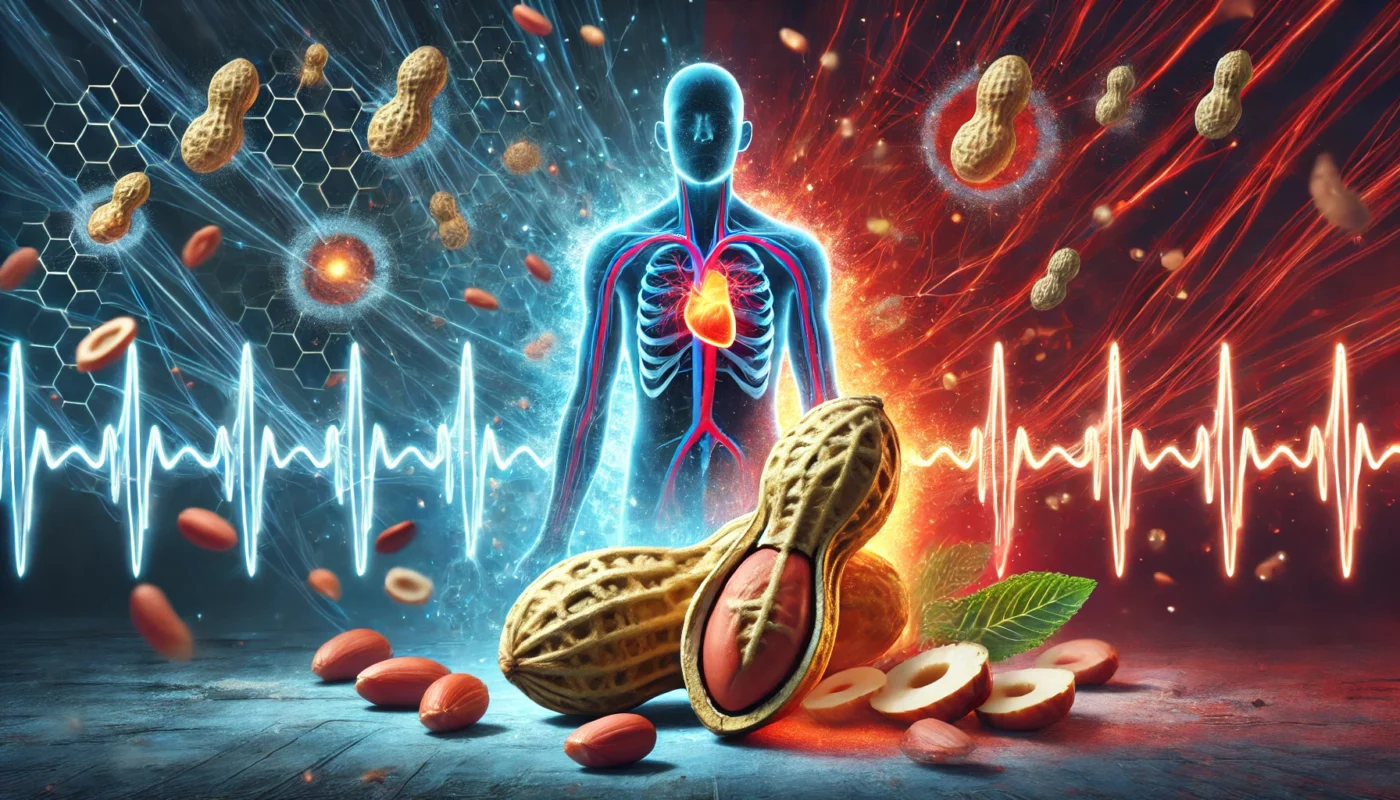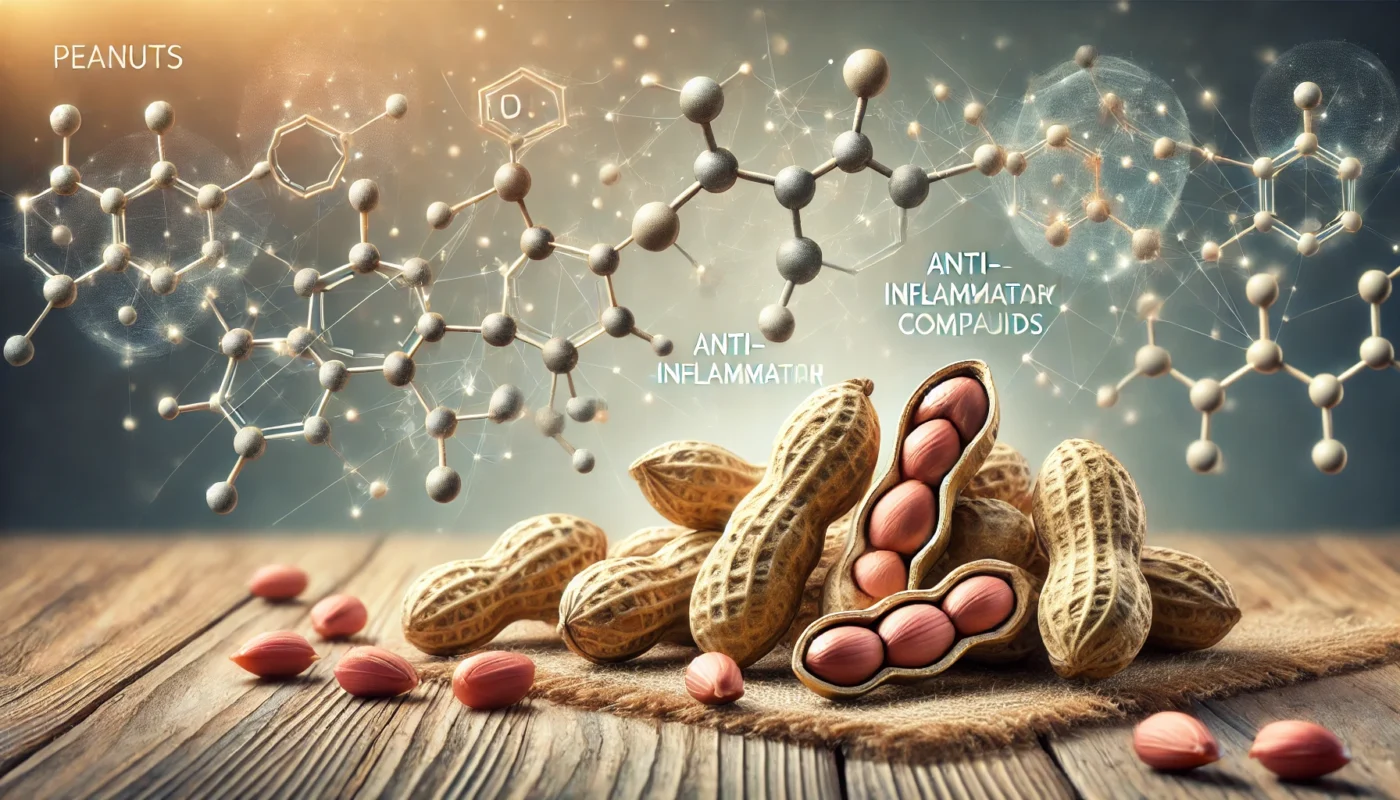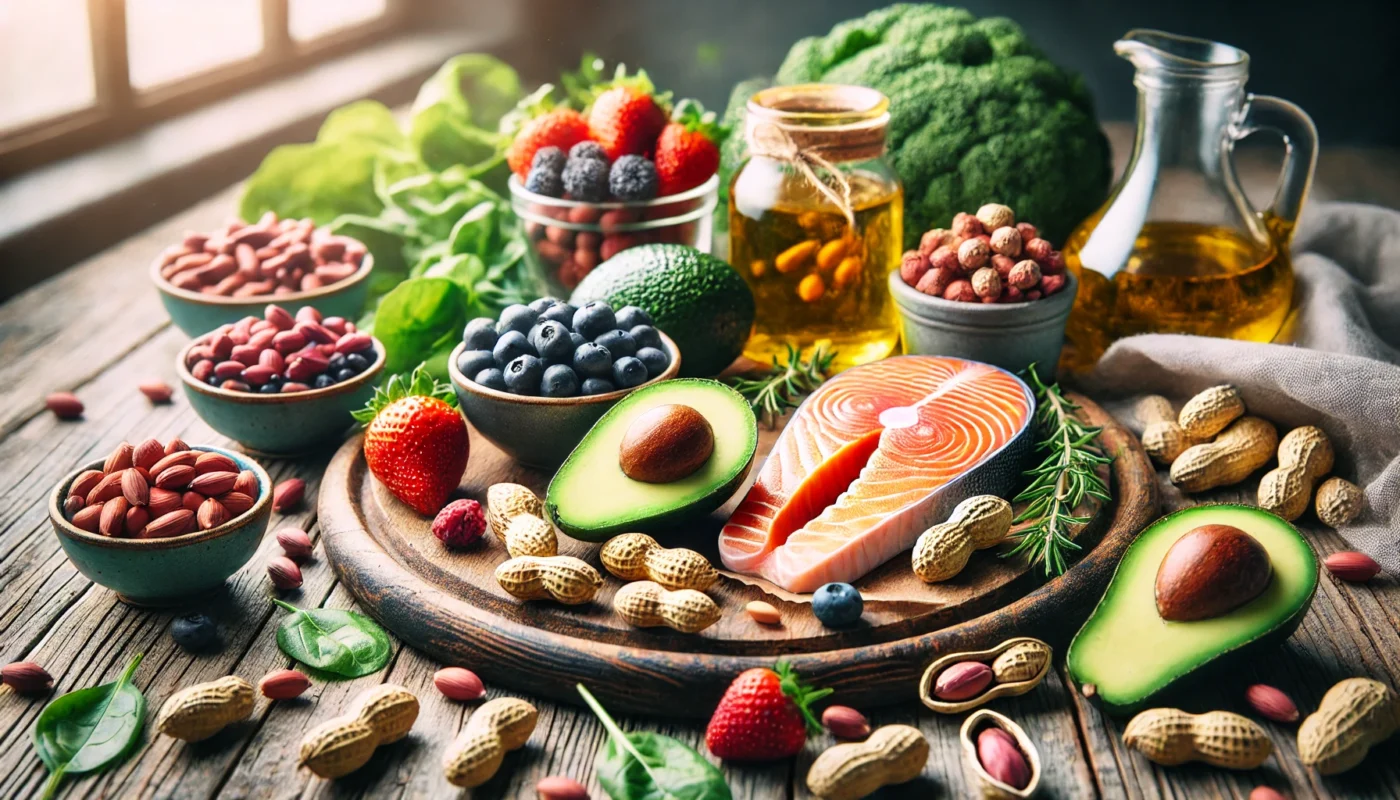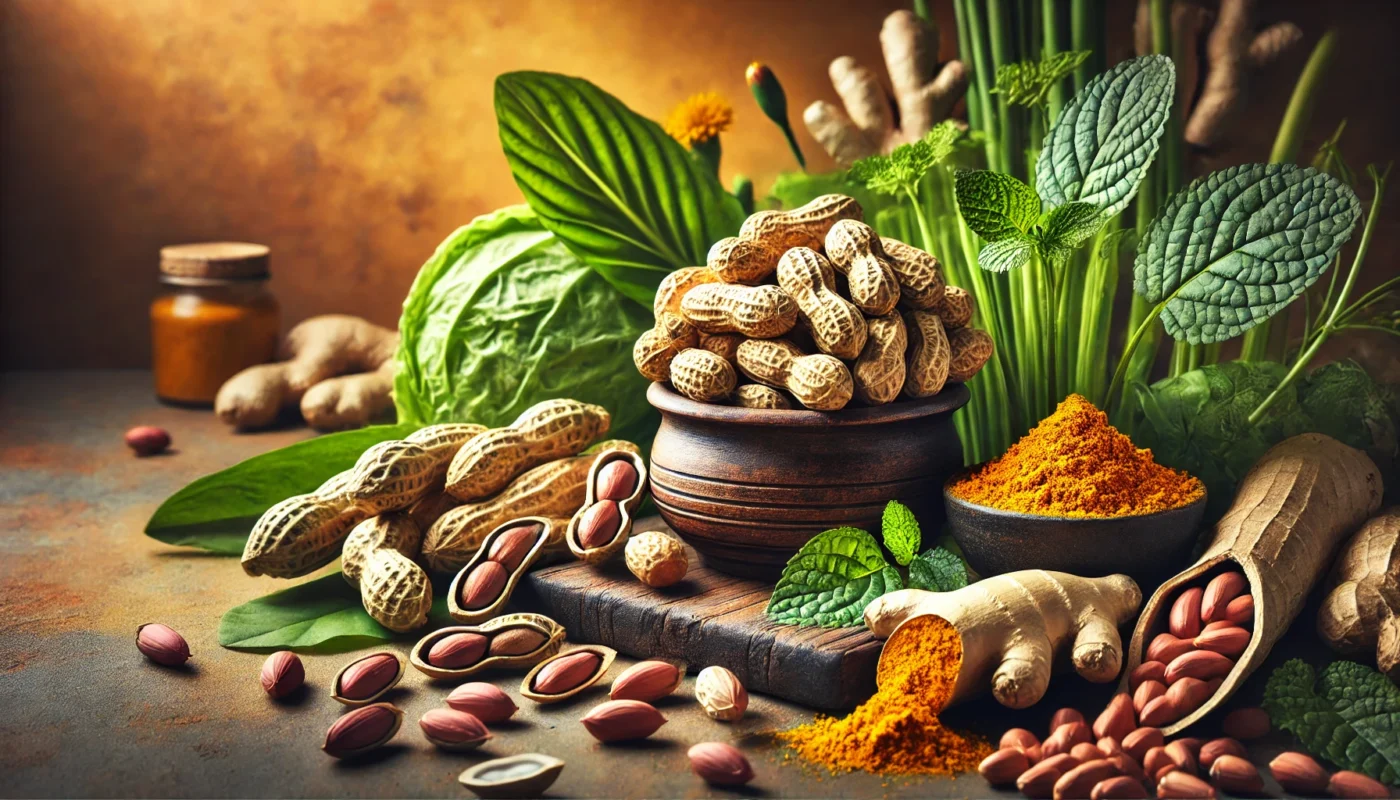Inflammation is a response of the body’s immune system to injury or infection. While it is a natural and protective mechanism, chronic inflammation is linked to a multitude of health issues, including arthritis, heart disease, and even certain types of cancer. As such, managing inflammation is crucial for maintaining overall health and wellbeing. Surprisingly, peanuts, often underestimated in nutritional discussions, can play a significant role in combating inflammation.
You may also like: 20 Powerful Anti-Inflammatory Foods
Understanding Inflammation and Its Causes
Inflammation is the body’s innate response to harmful stimuli, such as pathogens, damaged cells, or irritants. The aim of this response is to eliminate the initial cause of cell injury, clear out damaged cells and tissues, and establish a repair process. However, when inflammation becomes chronic, it can lead to various diseases.
Acute vs. Chronic Inflammation
Acute inflammation is the body’s immediate reaction to tissue damage, characterized by symptoms such as redness, heat, swelling, and pain. This response is short-lived and typically resolves once the injury is healed. Chronic inflammation, on the other hand, persists over time and can result from ongoing exposure to harmful stimuli or autoimmune disorders where the body mistakenly attacks its own tissues.
Common Triggers of Inflammation
Several factors can trigger inflammation, including infections, injuries, and exposure to environmental toxins. Lifestyle choices, such as smoking, excessive alcohol consumption, and a sedentary lifestyle, can also contribute to inflammation. Understanding these triggers is crucial for developing strategies to prevent and manage inflammatory conditions.
Long-Term Health Implications
Uncontrolled inflammation can contribute to the development of various chronic diseases, including cardiovascular disease, diabetes, and cancer. It can also exacerbate conditions like obesity and metabolic syndrome. Recognizing the link between inflammation and these health issues underscores the importance of managing inflammation through lifestyle and dietary choices.
The Role of Diet in Inflammation
A poor diet is a significant contributor to chronic inflammation. Consuming high amounts of sugar and processed foods can exacerbate inflammatory responses. For example, sugar is known to aggravate joint pain, especially in conditions like arthritis.
Inflammatory Foods to Avoid
Certain foods are known to promote inflammation, including refined carbohydrates, fried foods, and red and processed meats. These foods can increase levels of inflammatory markers in the body, leading to a heightened risk of chronic diseases. Reducing or eliminating these items from your diet can significantly impact your overall inflammation levels.
Anti-Inflammatory Foods to Embrace
Conversely, some foods have anti-inflammatory properties and can help reduce inflammation. These include omega-3 fatty acids found in fatty fish, antioxidants in fruits and vegetables, and healthy fats in nuts and seeds. Incorporating these foods into your diet can support your body’s natural inflammatory response and promote health.
The Impact of Dietary Patterns
Beyond individual foods, the overall dietary pattern can influence inflammation. Diets rich in whole, unprocessed foods, such as the Mediterranean diet, are associated with lower levels of inflammation. Emphasizing plant-based foods, lean proteins, and healthy fats can create a dietary environment that minimizes inflammation.
The Peanut Controversy
Peanuts have often been scrutinized in discussions about inflammation. Some argue that they can cause inflammation, particularly in individuals with peanut allergies. However, for most people, peanuts are not inflammatory and can be quite beneficial.
Allergies and Inflammation
For individuals with peanut allergies, consuming peanuts can trigger an immune response that leads to inflammation. This is a specific reaction and does not apply to the general population. Understanding this distinction is important when evaluating the inflammatory potential of peanuts.

Peanuts in Popular Diets
Certain dietary trends, such as the Paleo diet, discourage the consumption of legumes, including peanuts, due to perceived inflammatory effects. However, scientific evidence does not support the idea that peanuts cause inflammation in most people. Evaluating dietary advice critically can help individuals make informed choices.
Benefits for the Majority
For the majority of people without allergies, peanuts offer numerous health benefits. They are rich in nutrients and bioactive compounds that can support overall health and potentially reduce inflammation. Recognizing the positive impact of peanuts can help dispel myths about their inflammatory nature.
Peanuts: Nutritional Powerhouse
Peanuts are packed with essential nutrients, including protein, healthy fats, fiber, vitamins, and minerals. They also contain bioactive compounds with anti-inflammatory properties, such as resveratrol, phenolic acids, flavonoids, and phytosterols.
Nutrient Density and Health
The nutrient density of peanuts makes them an excellent addition to a balanced diet. They provide a substantial amount of protein and healthy fats, which are essential for energy and cell function. Additionally, the fiber in peanuts supports digestive health and can help regulate blood sugar levels.
Bioactive Compounds and Their Benefits
Bioactive compounds in peanuts, like phenolic acids and flavonoids, have been shown to exhibit antioxidant and anti-inflammatory effects. These compounds help protect cells from oxidative stress and can reduce inflammation markers in the body. Including peanuts in your diet can leverage these benefits for improved health.
Comparing Peanuts to Other Nuts
Peanuts are often compared to other nuts in terms of nutritional content and health benefits. While each nut has unique properties, peanuts are particularly cost-effective and widely available, making them an accessible option for many people. Understanding the relative advantages of peanuts can guide dietary decisions.
Peanuts and Anti-Inflammatory Properties
Research suggests that peanuts and peanut butter may actually have anti-inflammatory effects rather than causing inflammation. The presence of monounsaturated and polyunsaturated fats, coupled with bioactive compounds, contributes to their anti-inflammatory properties.
The Role of Healthy Fats
The healthy fats in peanuts, including monounsaturated and polyunsaturated fats, are known to support heart health and reduce inflammation. These fats can help lower bad cholesterol levels and reduce the risk of cardiovascular disease. Incorporating peanuts into your diet can contribute to a heart-healthy, anti-inflammatory lifestyle.
Scientific Evidence Supporting Peanuts
Numerous studies have examined the effects of peanut consumption on inflammation and health. Research consistently shows that peanuts can reduce inflammatory markers and support overall health. Staying informed about scientific findings can enhance understanding of peanuts’ role in an anti-inflammatory diet.
Peanuts and Heart Health
Peanuts’ nutrient profile is particularly beneficial for heart health. The combination of healthy fats, fiber, and bioactive compounds can lower the risk of heart disease by reducing inflammation and improving cholesterol levels. Including peanuts in your diet can be a strategic choice for maintaining cardiovascular health.
Resveratrol: A Key Compound
Resveratrol, found in peanuts, is a powerful antioxidant that has been shown to reduce inflammation. It is the same compound found in red wine, which is often cited for its heart health benefits. Resveratrol works by inhibiting the production of pro-inflammatory molecules.
Mechanism of Action
Resveratrol exerts its anti-inflammatory effects by interfering with signaling pathways that lead to the production of inflammatory molecules. This action helps reduce inflammation at the cellular level, contributing to improved health outcomes. Understanding how resveratrol works can inform dietary choices that emphasize anti-inflammatory foods.
Resveratrol Beyond Peanuts
While peanuts are a good source of resveratrol, it can also be found in other foods, such as grapes and berries. Including a variety of resveratrol-rich foods in your diet can enhance its anti-inflammatory benefits. Exploring diverse food sources can diversify nutrient intake and support health.
Potential Health Benefits
Beyond its anti-inflammatory properties, resveratrol has been linked to numerous health benefits, including improved insulin sensitivity and potential cancer-fighting effects. Consuming resveratrol-rich foods, like peanuts, can support overall health and wellness. Being aware of these benefits can encourage the inclusion of such foods in the diet.
Debunking Myths: Are Peanuts Inflammatory?
The misconception that peanuts are inflammatory may stem from their classification as legumes, which some diets like Paleo discourage. However, scientific research does not support the claim that peanuts cause inflammation in the general population.
Understanding Legumes and Inflammation
Legumes, including peanuts, are often criticized in certain dietary circles for their potential to cause inflammation. However, this perspective lacks substantial scientific backing. Legumes are rich in nutrients and offer numerous health benefits, challenging the idea that they are inherently inflammatory.

Evaluating Dietary Claims
When assessing dietary claims, it’s important to consider the scientific evidence rather than relying solely on popular opinions. Research consistently demonstrates that peanuts do not cause inflammation in most people. Critical evaluation of dietary trends can lead to more informed and health-conscious decisions.
The Bigger Picture: Overall Diet and Lifestyle
Rather than focusing solely on individual foods, it’s essential to consider the broader context of diet and lifestyle. A balanced diet, rich in whole foods like peanuts, supports overall health and minimizes inflammation. Emphasizing a holistic approach can yield better long-term health outcomes.
Peanut Butter: Friend or Foe?
Concerns about peanut butter often revolve around added sugars and oils, which can contribute to inflammation. Choosing natural peanut butter, which contains only peanuts and possibly a pinch of salt, can mitigate these concerns.
Choosing the Right Peanut Butter
When selecting peanut butter, opting for natural varieties without added sugars or hydrogenated oils is crucial. These additives can negate the health benefits of peanuts and contribute to inflammation. Reading labels and making informed choices can enhance the nutritional quality of peanut butter in your diet.
Homemade Peanut Butter: A Healthier Option
Making peanut butter at home is a simple way to ensure it contains only natural ingredients. By blending peanuts with a touch of salt, you can create a healthy and delicious spread. This approach allows for greater control over the nutritional content and can support an anti-inflammatory diet.
Incorporating Peanut Butter into Meals
Peanut butter can be a versatile ingredient in various meals and snacks. It can be used in smoothies, on whole-grain toast, or as a dip for fruits and vegetables. Finding creative ways to incorporate peanut butter can enhance its role in your diet while reaping its health benefits.
Practical Tips for Incorporating Peanuts into Your Diet
Moderation is Key
While peanuts can be beneficial, moderation is crucial. Overconsumption can lead to excessive calorie intake and potential weight gain, which can exacerbate inflammation.
Balancing Portion Sizes
To enjoy the benefits of peanuts without overindulging, it’s important to be mindful of portion sizes. A small handful of peanuts or a tablespoon of peanut butter can provide nutritional benefits without excessive calories. Being conscious of serving sizes can help maintain a balanced diet.
Incorporating Peanuts into Meals
Peanuts can be easily added to various meals, such as salads, stir-fries, and oatmeal. This versatility allows you to enjoy their nutritional benefits in different culinary contexts. Experimenting with recipes can make incorporating peanuts into your diet enjoyable and sustainable.
Monitoring Caloric Intake
While peanuts are nutrient-dense, they are also calorie-dense. Tracking your overall caloric intake can help ensure that peanuts contribute positively to your diet without leading to weight gain. Balancing peanuts with other healthy foods can support a nutritious and calorie-conscious eating plan.
Pair with Anti-Inflammatory Foods
For an anti-inflammatory boost, combine peanuts with other foods known for their anti-inflammatory properties, such as leafy greens, fatty fish, and berries.
Creating Balanced Meals
Combining peanuts with a variety of anti-inflammatory foods can create balanced and nutritious meals. For example, pairing peanuts with salmon and spinach can enhance the overall anti-inflammatory potential of your diet. Emphasizing diversity in food choices can optimize nutritional intake.
Snack Ideas with Peanuts
Peanuts can be a convenient and healthy snack when paired with other nutritious foods. Consider combining them with fresh fruit or a small serving of yogurt for a balanced snack. Exploring different snack combinations can keep your diet exciting and satisfying.
Enhancing Meal Flavor and Texture
Peanuts can add flavor and texture to meals, making them more enjoyable. Their crunch and richness complement various dishes, from salads to desserts. Incorporating peanuts creatively can enhance both the taste and nutritional value of your meals.
Opt for Natural Options
When choosing peanut butter, opt for natural varieties without added sugars or oils. This ensures you’re getting the benefits of peanuts without the inflammatory drawbacks of additives.
Understanding Ingredient Labels
Reading ingredient labels is essential when selecting peanut butter. Look for products with minimal ingredients, such as peanuts and salt, to avoid unnecessary additives. Being informed about product contents can lead to healthier food choices.
Exploring Different Brands
Not all peanut butter brands are created equal. Exploring different brands can help you find options that align with your health goals and taste preferences. Seeking out brands that prioritize natural ingredients can enhance the quality of your diet.
DIY Peanut Butter: A Creative Solution
Making peanut butter at home allows for complete control over the ingredients and flavor. By experimenting with different recipes, you can customize your peanut butter to suit your taste and health needs. This creative approach can make healthy eating more enjoyable.

Conclusion: Embrace Peanuts in Your Anti-Inflammatory Diet
Peanuts, when consumed in moderation and as part of a balanced diet, can be a surprising ally in the fight against inflammation. Their nutrient-rich profile and presence of bioactive compounds make them a valuable addition to any anti-inflammatory diet.
By debunking myths and understanding the true impact of peanuts on inflammation, individuals can make informed dietary choices that contribute to overall health and wellness.
Incorporate peanuts into your diet as a tasty, nutritious, and inflammation-fighting food. Whether you’re a fitness enthusiast, health enthusiast, or managing a medical condition, peanuts can support your journey towards better health.
In conclusion, it’s time to give peanuts the recognition they deserve in the realm of health and wellness. By embracing the benefits they offer, you can enhance your diet and take proactive steps towards reducing inflammation and improving your overall health.
Further Reading:
Top 8 Anti-Inflammatory Foods You Should Eat
Effect of Nuts on Markers of Inflammation and Oxidative Stress: A Narrative Review
peanut butter, natural ingredients, anti-inflammatory diet, healthy eating, nutrition, homemade peanut butter, portion control, caloric intake, healthy snacks, ingredient labels, food choices, inflammation, dietary tips, meal planning, wellness
Important Note: The information contained in this article is for general informational purposes only, and should not be construed as health or medical advice, nor is it intended to diagnose, prevent, treat, or cure any disease or health condition. Before embarking on any diet, fitness regimen, or program of nutritional supplementation, it is advisable to consult your healthcare professional in order to determine its safety and probable efficacy in terms of your individual state of health.
Regarding Nutritional Supplements Or Other Non-Prescription Health Products: If any nutritional supplements or other non-prescription health products are mentioned in the foregoing article, any claims or statements made about them have not been evaluated by the U.S. Food and Drug Administration, and such nutritional supplements or other health products are not intended to diagnose, treat, cure, or prevent any disease

